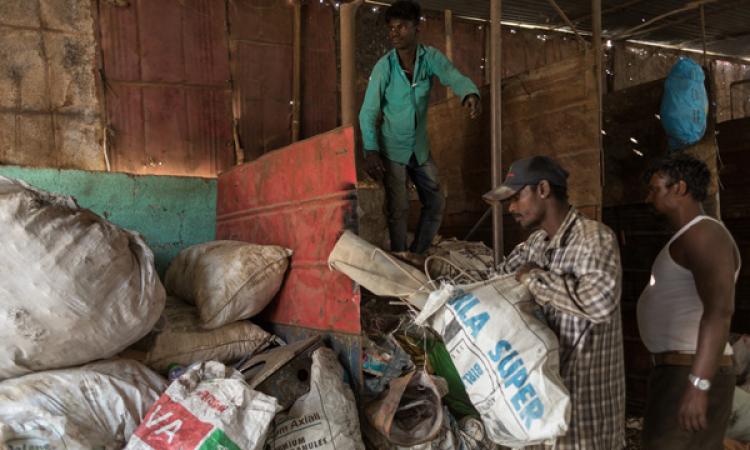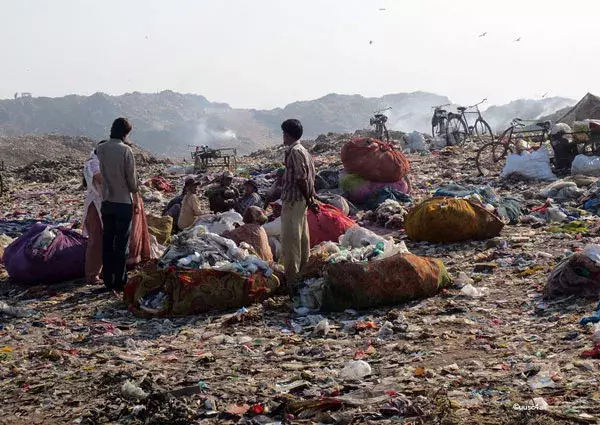Improving Lives of Waste Pickers in India
This 3ie-led evaluation will inform future design and scale-up of the Saamuhika Shakti or Collective Impact initiative that aims to improve the lives of waste pickers in Bengaluru, in India’s southern state of Karnataka, through a coordinated multi-sectoral approach. Initiated by the H&M Foundation, the novel initiative brings together several organizations delivering mutually reinforcing interventions to address marginalization, violence, low income, poor health and education, inadequate sanitation and limited access to finance, and welfare schemes among waste-picker households.

About the project and its objectives
Waste pickers earn their living by collecting solid waste and recovering reusable and recyclable materials, which are then sold to recyclers through intermediaries. Despite their economic and environmental contribution to cities, waste pickers are usually informal workers occupying the lowest rungs of urban society and struggling to lead healthy and productive lives. According to an unpublished study by FSG in 2020, there are about 22,500 to 35,000 waste pickers living in the Bengaluru municipal corporation region. The study finds that waste pickers belong to disadvantaged social groups and rarely complete education. Given that waste picking is largely unrecognized by law, waste pickers lack social protection and suffer from various forms of social and economic exclusion.
The Saamuhika Shakti initiative recognizes that complex interrelated social challenges, such as those faced by waste pickers, cannot be addressed sustainably through siloed intervention approaches. For instance, an education intervention focused on girls in waste picker households – without simultaneously addressing social exclusion, poor water, sanitation and hygiene, substance abuse and domestic violence – may not yield the desired outcomes. A multi-pronged initiative can better address systemic exclusions and contribute to improving the welfare of waste pickers in Bengaluru.
Mapping partner intervention geographies
Understanding intervention geographies is critical to designing an impact evaluation of the Saamuhika Shakti initiative. 3ie, in consultation with Saamuhika Shakti partners, led a mapping exercise to list waste-picker localities in Bengaluru and identify the pockets where partners were implementing interventions. The exercise highlighted limited geographical overlap across various interventions and generated important learning around planning and roll-out of the initiative. The locality mapping database is now being used by partners to coordinate community outreach and improve layering of interventions in future.
Read more about partner interventions below.
Saamuhika Shakti intervention domains

Evaluation approach
The evaluation will use a mixed methods approach to assess if and how the initiative works to improve the lives of waste pickers and their families. It will assess how exposure to two or more interventions as opposed to a single or no intervention affects welfare outcomes (listed below) among waste pickers.
- Participation in skill training and labor force for improved income
- Access to social security benefits, loans and financial linkages
- Participation in collectives (such as self-help groups, common interest groups)
- Improvement in health status & reduced health spending
- Better education for children, especially, girls
- Reduced violence, including domestic violence
- Dignity and social acceptance
- Improved access and use of WASH facilities
About the partners
BBC Media Action
This intervention aims to bring changes in perceptions about waste picking and waste pickers. For waste pickers to experience greater acceptance from the society they live and work in, both the community and waste pickers need to shift the way they view this essential activity.
CARE India
The partner’s intervention is working to secure dignified alternative livelihood options through employability and entrepreneurial skills training, promoting waste picker collectives, access to relevant resources, and creating an enabling ecosystem.
Circular Apparel Innovation Factory (CAIF)
The partner will train waste pickers and support grassroots-level waste entrepreneurs to implement a Circular Textile Waste Management model through activities such as citizen awareness, collection, sorting and selling, and establishing market linkages.
Enviu
Together with CAIF, Enviu aims to establish an integrated Circular Textile Waste Management model in India to recover and reclaim value from (domestic) textile waste while creating green and sustained livelihoods for the informal waste pickers.
H&M Foundation
Saamuhika Shakti is initiated, managed and funded by the philanthropic organization, H&M Foundation.
Hasiru Dala
Hasiru Dala, which means Green Force in Kannada, will work under three broad umbrellas to support and empower the community: improving linkages to government schemes (health, finance, housing and security nets); addressing domestic violence; and responding to substance abuse in the communities through rehabilitation and support systems for waste pickers and their families.
LabourNet
Sambhav Foundation, the not for profit arm of LabourNet, aims to expand livelihood opportunities for waste pickers and their family members through skill development initiatives and employment support.
Sambhav Foundation
Sambhav Foundation aims to expand livelihood opportunities for waste pickers and their family members through skill development initiatives and employment support.
Save the Children India
The partner will focus on access to quality basic education for children from waste picker families and neighbouring communities. They will provide support at the household level, as well as infrastructure and capacity building at school and Anganwadi level.
WaterAid India
This partner intervention will focus on access to safe drinking water and improved sanitation for waste picker communities by catering to immediate needs, building awareness, gathering evidence of exclusion and liaising with the government.
Social Alpha
This intervention will incubate and enable mission-driven innovators and entrepreneurs to create sustainable and scalable social and environmental impact in the waste management industry – also leading to improvement of livelihoods for waste pickers.
The/Nudge Institute
The/Nudge Institute serves as the backbone organization for Saamuhika Shakti and is responsible for guiding the overall strategy and vision of the collective impact initiative. The Institute facilitates collaboration and coordination of activities, builds relationships, trust and buy-in from key ecosystem stakeholders and works towards mobilizing the right resources for collective success.
Contact us
For more information on the technical aspects of the project, please write to Chandan Jain (cjain@3ieimpact.org). If you have any other queries, please write to Mansoor Ali Sait (msait@3ieimpact.org).

